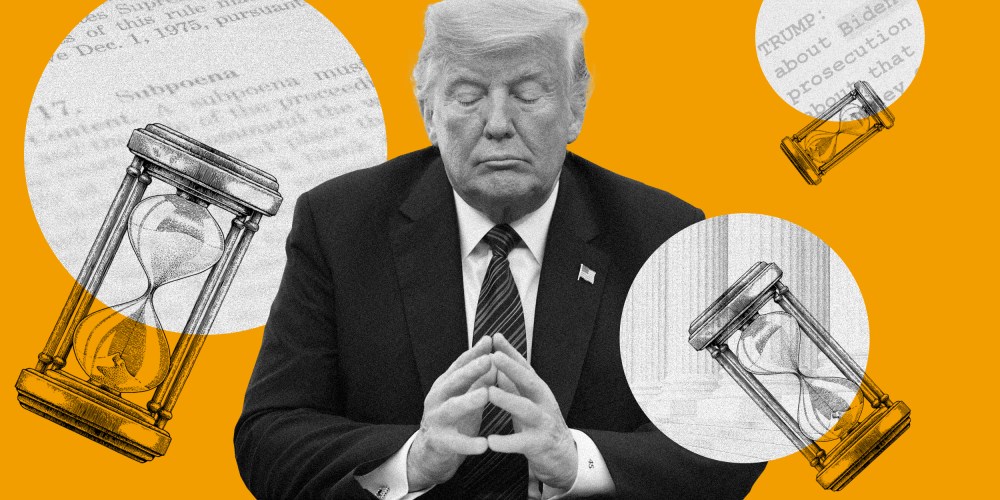For all his bluster, President Donald Trump’s No. 1 preferred legal tactic for the last four years has been markedly passive: At its core, the move is to delay at any and all cost. Trump has faced a litany of lawsuits throughout his term, many of them related to his personal affairs and their effect on his governance. But this time, the calendar is working against him. His most reliable tactic is failing him when he needs it most.
While Trump has threatened litigation as easily as breathing over the course of his career, he has rarely followed through.
This is admittedly a bit of a mea culpa: In the weeks ahead of Election Day, I was distressed by Trump’s clear messaging that he’d challenge the election results and potentially draw the whole mess before the Supreme Court. But that’s not exactly what we’ve seen in the last two weeks.
While Trump has threatened litigation as easily as breathing over the course of his career, he has rarely followed through. Instead, he’s more often the defendant in cases in which he or one of his companies is a party. By now, his lawyers have a pretty good playbook: Stall the proceedings. Buy more time for the president to figure out some other way to weasel out of whatever the plaintiff alleges he’s done this time.
And it hasn’t just worked — it has worked a lot.
Trump has been subpoenaed for his company’s finances in a Manhattan criminal investigation into potential insurance and bank fraud; he has been implicated in a campaign finance scheme to cover up his extramarital fling with a porn actress; he has fought tooth and nail against attempts by Democrats — who claim he’s been violating the Emoluments Clause of the Constitution — to get a peek under the hood of his businesses. And in all of these instances, he has managed to run out the clock.

The Supreme Court ruled in July that Manhattan District Attorney Cyrus Vance was within his rights to ask for Trump’s financial records, tossing his claims of “absolute immunity” from state criminal cases while president straight in the trash. The president’s legal team in response simply filed new motions to stay the decision, now arguing that Vance’s subpoena was overly broad and was issued in bad faith. When a district judge rejected that claim, his lawyers appealed. They lost the appeal, too, and now the case seems to be heading to the Supreme Court — again.
Meanwhile, aside from what they’ve read in The New York Times, Democratic lawmakers still have seen neither hide nor hair of Trump’s tax returns. The Supreme Court offered more or less a draw between the executive and legislative branches. The justices ruled in July that the president’s proposed restrictions on what documents Congress could ask him for went too far, but they also said Congress had overreached in its subpoenas.
Trump’s supporters may believe his claim that the election was rigged, but they aren’t taking to the streets.
Congressional Democrats have also been blocked from seeing the innards of some of special counsel Robert Mueller’s investigation into links between the 2016 Trump campaign and Russia. That case is pending before the Supreme Court, but House Democrats moved Tuesday to postpone arguments, currently scheduled for Dec. 2, seeing it as a moot point in light of President-elect Joe Biden’s win.
In some of the cases that Trump has been forced to fight, including those over whether administration officials have to turn over evidence in an impeachment case and — improbably — whether he can be sued for defamation for speaking out against author E. Jean Carroll, he has brought the full force of the Justice Department into play. Federal lawyers have argued that he was acting as a government employee when he denied Carroll’s rape allegation and claimed that she was looking to make money by lying. A judge rejected that argument, but while the case is still moving forward, the Justice Department’s intervention sidelined discovery in the suit until after the election.

Compare that string of what technically count as wins to the unmitigated disaster that has been Trump’s attempt to go on offense in court against the election results. The weekend saw a series of losses for the campaign in state and federal courts, even as it has rolled back some of its arguments. The campaign abandoned its case in Arizona on Friday. The conservative group True the Vote abruptly dropped its cases in Georgia, Michigan, Pennsylvania and Wisconsin on Monday. On Tuesday, Pennsylvania’s Supreme Court rejected the Trump campaign’s claim that election officials violated the law by keeping voting officials and observers separated.
Unlike when he has been able to lean on the Justice Department, his legal team isn’t exactly made up of A-listers. In one case filed in Pennsylvania, most of the lawyers working the suit have quit. A federal judge didn’t look kindly on an attempt from the lawyer recruited to take over — who Reuters reporter Jan Wolfe noted is better known for talk radio than election law — to postpone arguments for another day. The same lawyer had also previously said on his radio show that the campaign’s lawsuits “will not work.”
To recap:
– 3 more Trump lawyers asked to quit
– Judge allowed 2 of the 3 to drop out
– Trump added a lawyer better know for a local radio show than election law
– New guy tried to postpone tmrw’s hearing
– Judge denied in a terse order that threw low-key shade https://t.co/EGqg8qRfj7












